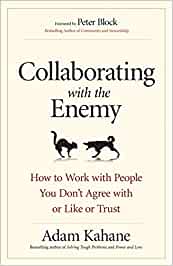
It's somehow already the middle of June, and we're approaching the midpoint of the year. Which means (for some of us at least) tis also the season for performance reviews - if you're a people leader you may be giving them, and hopefully you're also on the receiving end of some thoughtful conversation about what you're doing well, where you could use some support, and a manageable number of goals.
And there are ways to make these conversations feel less like a trip to the dentist!
In an ideal world, the best performance development conversations are designed to help bring out the best in each and every team member. And they happen most easily and successfully when both parties have given some thought to the conversation and come prepared to dial up both their listening skills and their curiosity.
At their best, performance conversations have the biggest impact when they're a two way street with both parties engaged.
First things first. Preparation.
Begin with the end in mind. Whether you're on the giving or the receiving end of a performance review, spend some time thinking about what you would like the other person to know before you have the conversation.
Where have you (or your team member) knocked it out of the park over the last few months? And where (if you're being honest) have you (or your team member) struggled a bit? And what sort of support from you (or your manager) might help going forward.
Don't overwhelm yourself, or your team member, by reviewing a laundry list of the good/bad/ugly things from the last 6 months (or possibly even longer).
Hit the highlights, group your ideas into themes - and if you're not already doing this, I'd invite you to start giving people feedback in real time going forward. For example, after a great meeting take someone aside and tell them exactly and specifically what you liked about how they showed up.
If you're a manager, consider a start/stop/continue approach. What one thing could your team member start doing, stop doing and continue doing that would have the biggest impact on their performance over the next few months?
Less telling, more listening. We have two ears and one mouth for a reason! And please don't assume your team member will take your suggestion/requirement immediately onboard. This needs to be a conversation - a negotiation, if you will. Clarity and alignment is critical when it comes to setting goals.
If you're having your review and you don't understand what's being shared or why it matters, ask for clarity. And specifics. As in "what would success look like when it comes to (fill in the blank)".
And one last thought here: remember that we all have blind spots, and that perception (and perspective) are reality. Consider these statements:
How I see me: Shy | Passionate | High Standards | Strong Willed | Quirky
How you may see me: Aloof | Emotional | Hypercritical | Stubborn | Annoying
You say potato, I say patato. Both may be equally true! Because - well, people are complicated. Which is what makes this work thing we're doing together all the more interesting, to say the least.
I'm going to stop there for now - I've got lots more ideas, but I don't want to send you, Dear Reader, into overwhelm.
I would love to hear from you, however. Have you got a particular performance review challenge or question? Simply hit "reply" to this newsletter and tell me more. I promise to respond. And if you or your team could use some training on this, we'd love to help. Let's do this better!
Many thanks,
Darcy & the team at The Management Coach
Check out our website here
Connect with me on LinkedIn
On the Shelf:
Collaborating with the Enemy: How to Work with People You Don't Agree with or Like or Trust - how's that for a title for a useful book? A lovely woman I worked with years ago recently gifted me this small (it comes in at around 100 pages) yet mighty tome from Adam Kahane which I'd not come across before.
At some point or another we've all had to work with people we don't particularly care for, or see eye to eye with. How can we collaborate better? Adam's got some ideas from decades of social enterprise work with international communities in places like South Africa, Columbia, Israel, Thailand - countries where there are lots of different and often opposing views as to the best way forward.
He's honest about some of his failures, and happy to share what he's seen work most successfully. One idea I particularly like is to listen for possibility rather than certainty - because my story is not the only true story. Back to my potato/patato point above.
Collaborating with the Enemy is a quick read (which I like - because I think most business books are far too long and could be summed up in a page or two) - and powerful.
And there are ways to make these conversations feel less like a trip to the dentist!
In an ideal world, the best performance development conversations are designed to help bring out the best in each and every team member. And they happen most easily and successfully when both parties have given some thought to the conversation and come prepared to dial up both their listening skills and their curiosity.
At their best, performance conversations have the biggest impact when they're a two way street with both parties engaged.
First things first. Preparation.
Begin with the end in mind. Whether you're on the giving or the receiving end of a performance review, spend some time thinking about what you would like the other person to know before you have the conversation.
Where have you (or your team member) knocked it out of the park over the last few months? And where (if you're being honest) have you (or your team member) struggled a bit? And what sort of support from you (or your manager) might help going forward.
Don't overwhelm yourself, or your team member, by reviewing a laundry list of the good/bad/ugly things from the last 6 months (or possibly even longer).
Hit the highlights, group your ideas into themes - and if you're not already doing this, I'd invite you to start giving people feedback in real time going forward. For example, after a great meeting take someone aside and tell them exactly and specifically what you liked about how they showed up.
If you're a manager, consider a start/stop/continue approach. What one thing could your team member start doing, stop doing and continue doing that would have the biggest impact on their performance over the next few months?
Less telling, more listening. We have two ears and one mouth for a reason! And please don't assume your team member will take your suggestion/requirement immediately onboard. This needs to be a conversation - a negotiation, if you will. Clarity and alignment is critical when it comes to setting goals.
If you're having your review and you don't understand what's being shared or why it matters, ask for clarity. And specifics. As in "what would success look like when it comes to (fill in the blank)".
And one last thought here: remember that we all have blind spots, and that perception (and perspective) are reality. Consider these statements:
How I see me: Shy | Passionate | High Standards | Strong Willed | Quirky
How you may see me: Aloof | Emotional | Hypercritical | Stubborn | Annoying
You say potato, I say patato. Both may be equally true! Because - well, people are complicated. Which is what makes this work thing we're doing together all the more interesting, to say the least.
I'm going to stop there for now - I've got lots more ideas, but I don't want to send you, Dear Reader, into overwhelm.
I would love to hear from you, however. Have you got a particular performance review challenge or question? Simply hit "reply" to this newsletter and tell me more. I promise to respond. And if you or your team could use some training on this, we'd love to help. Let's do this better!
Many thanks,
Darcy & the team at The Management Coach
Check out our website here
Connect with me on LinkedIn
On the Shelf:
Collaborating with the Enemy: How to Work with People You Don't Agree with or Like or Trust - how's that for a title for a useful book? A lovely woman I worked with years ago recently gifted me this small (it comes in at around 100 pages) yet mighty tome from Adam Kahane which I'd not come across before.
At some point or another we've all had to work with people we don't particularly care for, or see eye to eye with. How can we collaborate better? Adam's got some ideas from decades of social enterprise work with international communities in places like South Africa, Columbia, Israel, Thailand - countries where there are lots of different and often opposing views as to the best way forward.
He's honest about some of his failures, and happy to share what he's seen work most successfully. One idea I particularly like is to listen for possibility rather than certainty - because my story is not the only true story. Back to my potato/patato point above.
Collaborating with the Enemy is a quick read (which I like - because I think most business books are far too long and could be summed up in a page or two) - and powerful.

 RSS Feed
RSS Feed
